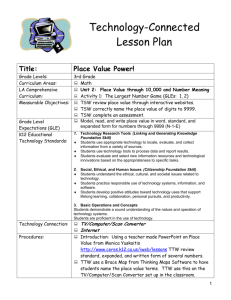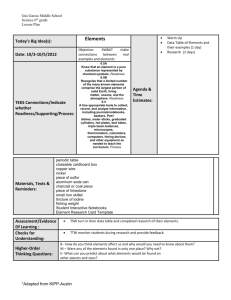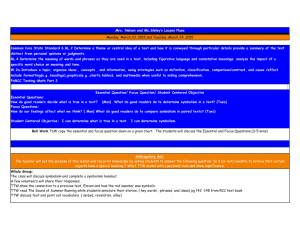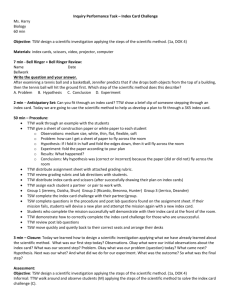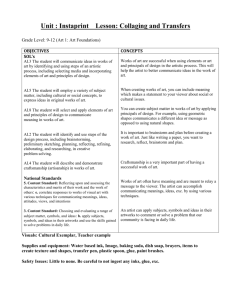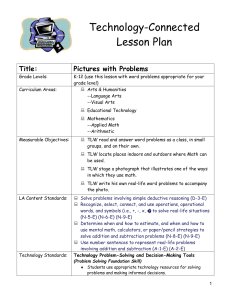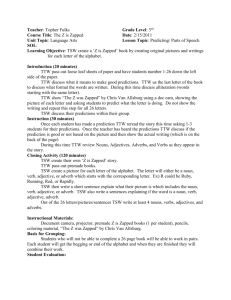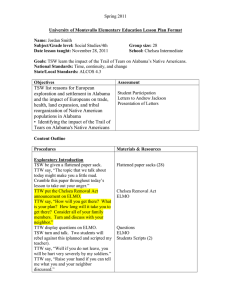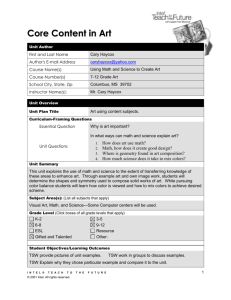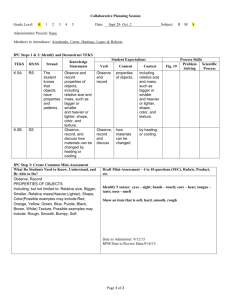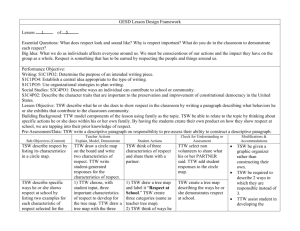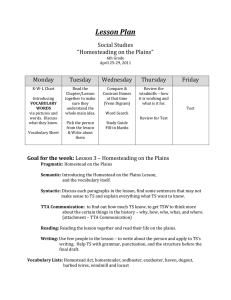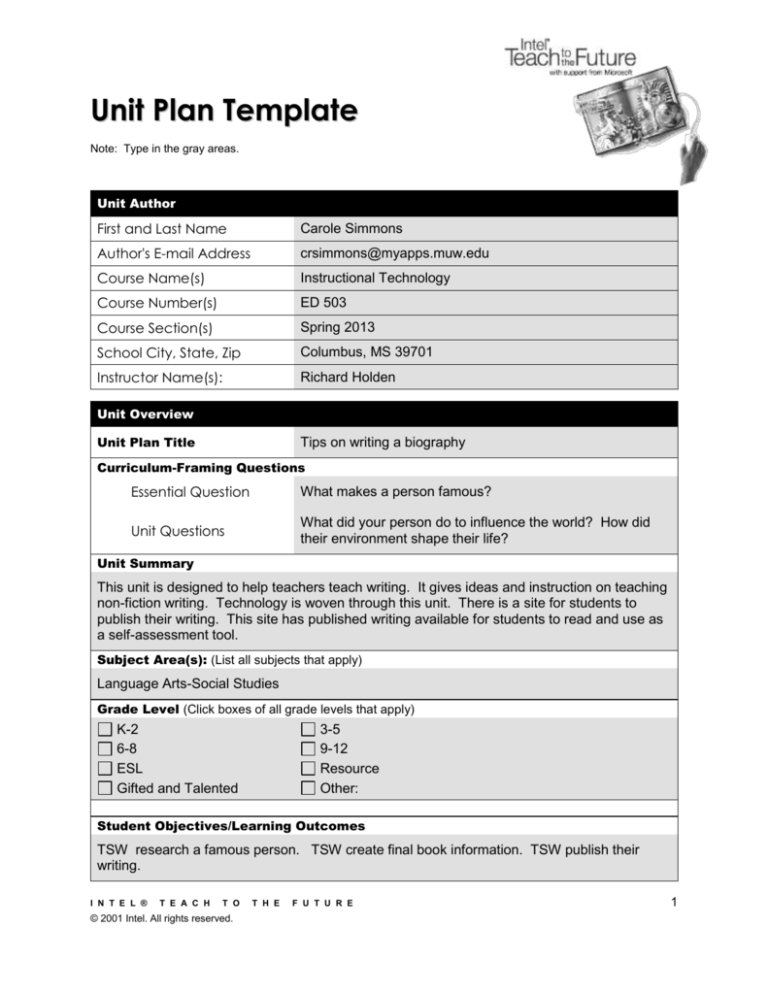
Unit Plan Template
Note: Type in the gray areas.
Unit Author
First and Last Name
Carole Simmons
Author's E-mail Address
crsimmons@myapps.muw.edu
Course Name(s)
Instructional Technology
Course Number(s)
ED 503
Course Section(s)
Spring 2013
School City, State, Zip
Columbus, MS 39701
Instructor Name(s):
Richard Holden
Unit Overview
Unit Plan Title
Tips on writing a biography
Curriculum-Framing Questions
Essential Question
What makes a person famous?
Unit Questions
What did your person do to influence the world? How did
their environment shape their life?
Unit Summary
This unit is designed to help teachers teach writing. It gives ideas and instruction on teaching
non-fiction writing. Technology is woven through this unit. There is a site for students to
publish their writing. This site has published writing available for students to read and use as
a self-assessment tool.
Subject Area(s): (List all subjects that apply)
Language Arts-Social Studies
Grade Level (Click boxes of all grade levels that apply)
K-2
6-8
ESL
Gifted and Talented
3-5
9-12
Resource
Other:
Student Objectives/Learning Outcomes
TSW research a famous person. TSW create final book information. TSW publish their
writing.
I N T E L ®
T E A C H
T O
© 2001 Intel. All rights reserved.
T H E
F U T U R E
1
Targeted State Frameworks/Content Standards/Benchmarks
1d,g,2a1-4, 3a1-4
Procedures
Procedures:
Day 1- Each time slot is 45 minutes
TTW prompt open discussion about the phrase “famous person”.
Essential question: What makes a person famous?
TTW allow students to brainstorm this question and record responses.
Challenge students to describe qualities that characterize famous. Encourage students to
explain the impact that this person has on society.
Read A Picture Book of Harry Houdini by David A. Adler (author of over 200 children’s books)
a loud. After reading, TTW lead discussion of information for the text. Discussion will cover
ideas such as: person’s life, their influences, and the time era.
Day 2TTW show short clip on www.bio.com –there is a weekly featured person.
TSW work in groups. TSW list famous people. TSW work together to rate and report on only
5 famous people. Each group displays list giving reasons they chose this person.
Students decide on a person they want to research and give reasons why.
Day 3TSW make a biography journal... This will be their journal for reflection, a place to keep
information and sources, and record key questions.
TTW read Who was King Tut? By Margaret McCord. TTW prompt discussion about setting,
characters, and impact of King Tut. Allow time for students to comment. Student will write in
their biography journal a reflection of reading and discussion.
TTW introduce resource centers. TSW record in their journal resources needed for research.
TTW model how to write the source (generally). Example: encyclopedia, internet, book
TSW practice looking up entries in the encyclopedia. TTW model using an index. TSW will
practice.
Day 4TTW show www.
TTW ask if you could ask any question—just one question—what would it be. Why? TTW
give students time to think and respond.
First entry: TTW encourage whole group discussion by asking: “What questions would you
ask …?
Students will work in groups. In groups, each person will introduce their person. As a group,
brainstorm question to ask that person.
I N T E L ®
T E A C H
T O
© 2001 Intel. All rights reserved.
T H E
F U T U R E
2
After groups, TTW allow time for students to write in their journal key questions. Students
should list justification of questions.
Day 5TTW model writing an outline using main ideas from key question. TTW introduce and post
the rubric for this Famous Person Project. TTW introduce checklist for time on task
throughout project. Expectations are discussed and recorded by students.
The research process begins:
Presentations should include facts about person, contrition’s, examples of their work,
table of content, glossary, appendix, map locating migration of person if any.
Remediation- students may verbally record responses and /or type information
Challenge: make a time line of person’s life but charting major world events
Day6-10 TSW research and create.
TSW present their projects.
TSW view www.scholastic.com and read and evaluate their writing compared to a student of
the same age group.
Approximate Time Needed (Example: 45 minutes, 4 hours, 1 year, etc.)
45 minute slots for ten days
Prerequisite Skills
Listening, writing, reading skills.
Materials and Resources Required For Unit
Technology – Hardware (Click boxes of all equipment needed.)
Camera
Laser Disk
Computer(s)
Printer
Digital Camera
Projection System
DVD Player
Scanner
Internet Connection
Television
VCR
Video Camera
Video Conferencing Equip.
Other:
Technology – Software (Click boxes of all software needed.)
Database/Spreadsheet
Image Processing
Desktop Publishing
Internet Web Browser
E-mail Software
Multimedia
Encyclopedia on CD-ROM
Web Page Development
Word Processing
Other:
Printed Materials
Biography picture books, encyclopedias, atlas
Supplies
Computers, resource materials, paper, art material
Internet Resources
I N T E L ®
T E A C H
T O
© 2001 Intel. All rights reserved.
T H E
F U T U R E
3
Others
Accommodations for Differentiated Instruction
Resource Student
Students will type material or copy and paste, some
students will use a tape recorder to oral present material
Gifted Student
Create a timeline of the era your person lived-tell main
events in the world
Student Assessment
The teacher will use a checklist throughout the process. The final books will be graded
according to the rubric. Students will evaluate their own writing compared to others.
Page 4 of 4

